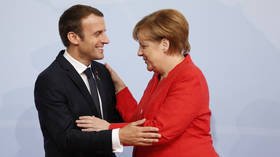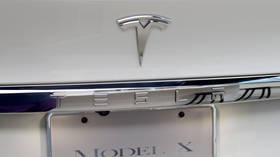France & Germany’s ‘Alliance for Multilateralism’ may not be as good as it sounds

Germany and France have announced the creation of a new ‘Alliance for Multilateralism’ to support international cooperation and the UN. Is it a much-needed step to counterbalance the US, or a reaction to the excesses of Trump?
On the one hand you could say it's a sign of Europe's biggest powers finally showing some teeth to the US.
The news that two of America's strongest allies in Europe are forming an ‘Alliance for Multilateralism’ – which will officially launch in September at the United Nations General Assembly – probably won't go down well in Washington, especially as we're also told that Canada, Japan and Australia have shown interest in joining the initiative.
As cited in Deutsche Welle, French Foreign Minister Jean-Yves Le Drian said the first objective would be to show that countries that “support multilateralism and support the United Nations remain the majority in the world.” US President Donald Trump wasn't mentioned by name, and while both he and his German counterpart Heiko Maas stressed that the initiative wasn't directed against America, it was clear when Le Drian talked about the “consequences of unilateralism and isolationism” who he was really referring to.
Also on rt.com 75 years on from D-Day, is it time Germany liberated itself from the US?Make no mistake: Trump's policies – as they impact on the world – certainly warrant an international response. The American president has pulled out of the Iran nuclear deal, calling it “an embarrassment” and the US has threatened secondary sanctions on countries like Germany, who continue to trade with the Islamic Republic. Trump has cut US funding for the UN, and withdrawn from the UN Human Rights Council, UNESCO and the Paris Climate Agreement – and recognised Israel's claims to the Golan Heights. This is in addition to calls for countries like Germany to pull out of the Nord Stream 2 gas project, which entails buying more expensive US LNG instead. The political right, as I pointed out in a recent op-ed, cheer Trump for his so-called ‘America First’ line – but it seems other countries, even US allies, aren't allowed to do the same.
It's clear too that many of the world's leading problems, whether we're talking climate change, organised crime, terrorism, protecting endangered wildlife and saving the world's oceans, can only be solved through an international, multilateral approach. We need international institutions which are respected and we need binding international agreements. Acknowledging this does not make one a ‘globalist’.
Yet, on reading about the proposals of Germany and France, I'm still a little bit worried. Just how genuine is the commitment of these leading European powers and indeed others who have reportedly been showing interest, to the UN and acting in accordance with international law?
READ MORE: In 1999, it was Yugoslavia in the crosshairs of the imperialists, now it’s Venezuela
Back in 1999, when we had a Democrat president, France and Germany joined in the illegal NATO attack on Yugoslavia, which did not have UNSC authorisation and was even in breach of NATO's own constitution. France too played a leading role in the destruction of Libya (which again took place under a Democratic Party president) and against all the diplomatic norms, recognised the Syrian rebel ‘National Coalition’ as the “sole representative of the Syrian people” in November 2012, even though it was highly debatable as to whether the rebels even had majority support in the country.
France has also been carrying out illegal air strikes on Syria. In December, France said it would stay in Syria, even after the US left. “For now of course we remain in Syria,”said European Affairs Minister Nathalie Loiseau. How's that for imperial arrogance?
So for France in particular to hold itself up as the custodian of what is ‘correct’ international behaviour – in contrast to the uncouth ‘cowboy’ Trump – is a bit rich to say the least.
Also on rt.com 70 years of NATO charts 70 years of brute force and hard powerLe Drian and Maas stressed that members of the ‘Alliance for Multilateralism’ would be expected to commit to a rules-based international order. That surely means the countries ending all illegal operations within Syria, otherwise the hypocrisy is there for all to see.
Venezuela also comes into the equation. Both France and Germany, the champions of ‘multilateralism’ and obeyers of the correct rules, followed Trump and the Americans in recognising the opposition politician Juan Guaido as the interim President of Venezuela – against all the diplomatic norms.
A genuine return to a rules-based international order, would mean all the countries of the world, big or small, agreeing to respect the charter of the United Nations.
France and Germany and many other countries in the world have legitimate grievances against Trump and his unilateralism, but it is a massive mistake to believe that current problems are down to one man. What really is the problem – and this goes totally against the idea of the sovereign equality of UN states – is the belief that some countries namely the Western powers and their global allies, have rights to interfere in other countries' affairs which others don't.
Just ask yourself what the French reaction would be if the Syrian government declared that the Gilets Jaunes (Yellow Wests) were the sole representative of the French people. Or if the Venezuelan government recognised Jean Luc-Melenchon or Marine Le Pen as the interim president of France.
So yes, the ‘Alliance for Multilateralism’, in as much as it shows Europe implied criticism of the US, is to be given cautious support.
But the leading protagonists need to start practicing what they preach before we start to pop the champagne corks.
Follow Neil Clark @NeilClark66 and @MightyMagyar
Think your friends would be interested? Share this story!
The statements, views and opinions expressed in this column are solely those of the author and do not necessarily represent those of RT.














